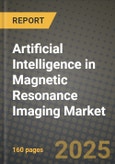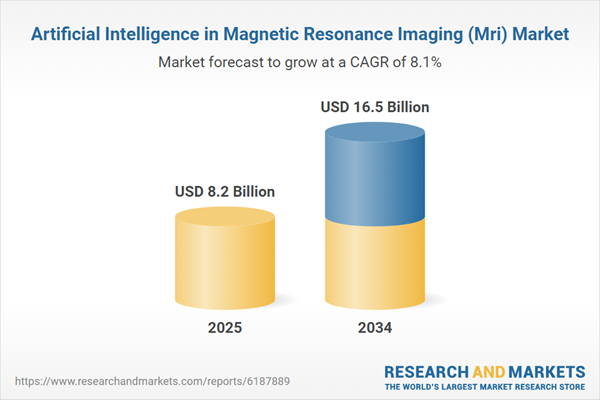The Artificial Intelligence in Magnetic Resonance Imaging (MRI) market focuses on using AI to enhance the acquisition, reconstruction, and analysis of MRI images. AI algorithms analyze MRI data to improve image quality, reduce scan times, and detect subtle abnormalities that may be difficult for humans to see. This helps radiologists make faster and more accurate diagnoses, leading to improved patient outcomes.
AI-powered MRI systems can automate image reconstruction, reduce noise, and enhance contrast. Machine learning algorithms can learn from labeled MRI data and adapt to different patient populations and disease conditions. AI also enables the development of personalized MRI protocols based on individual patient data. Additionally, AI can help automate the analysis of large
Additionally, AI can help automate the analysis of large volumes of MRI data, reducing the workload on radiologists. The market is driven by the increasing demand for accurate and efficient MRI diagnostics. The growing volume of MRI data and the need to reduce scan times are further fueling market growth. AI offers the potential to improve diagnostic accuracy, reduce healthcare costs, and enhance patient access to care. The development of advanced AI algorithms and the availability of large MRI datasets are further fueling market growth.
Key Insights: Artificial Intelligence In Magnetic Resonance Imaging (Mri) Market
AI-powered MRI image reconstruction and enhancement.Automated lesion detection and segmentation.
AI-driven MRI protocol optimization.
Predictive modeling for disease progression.
Integration of AI with other medical imaging modalities.
Increasing demand for accurate and efficient MRI diagnostics.
Growing volume of MRI data.
Need to reduce scan times.
Potential for improving diagnostic accuracy and reducing costs.
Advancements in AI and MRI technologies.
Ensuring accuracy and reliability of AI algorithms.
Data privacy and security concerns.
Integration of AI tools with existing MRI systems.
Regulatory approvals and clinical validation.
Lack of standardized datasets.
Artificial Intelligence In Magnetic Resonance Imaging (Mri) Market Segmentation
By Offering
- Hardware
- Software
- Services
By Technology
- Deep Learning
- Machine Learning
- Computer Vision
- NLP (Natural Language Processing)
- Speech Recognition
- Querying Method
- Other Technologies
By Deployment Type
- On-Premise
- Cloud
By Clinical Applications
- Musculoskeletal
- Colon
- Prostate
- Liver
- Cardiovascular
- Neurology
- Lung
- Breast
- Other Clinical Applications
By End-User
- Clinics
- Research and Laboratories
- Other End Users
Key Companies Analysed
- Intel Corporation
- International Business Machines Corporation
- Bayer AG
- Toshiba Corporation
- NVIDIA Corporation
- Siemens Healthcare GmbH
- Fujifilm Holdings Corporation
- Koninklijke Philips N.V.
- GE HealthCare Technologies Inc.
- Nuance Communications Inc.
- Esaote SPA
- Paige AI Inc.
- Orcam Inc.
- Aidoc Medical
- Lunit Inc.
- Viz.ai Inc.
- Digital Diagnostics Inc.
- Owkin Inc.
- Aurora Imaging Technologies Inc.
- Quibim SL
- Mirada Medical Ltd.
- Arterys Inc.
- Imbio LLC
- QMENTA
- Voxel Technology
- Sanrad Medical Systems Pvt ltd
- EchoNous Inc.
- Enlitic Inc.
- InformAI LLC
- Nano X Imaging Ltd.
Artificial Intelligence In Magnetic Resonance Imaging (Mri) Market Analytics
The report employs rigorous tools, including Porter’s Five Forces, value chain mapping, and scenario-based modeling, to assess supply-demand dynamics. Cross-sector influences from parent, derived, and substitute markets are evaluated to identify risks and opportunities. Trade and pricing analytics provide an up-to-date view of international flows, including leading exporters, importers, and regional price trends.Macroeconomic indicators, policy frameworks such as carbon pricing and energy security strategies, and evolving consumer behavior are considered in forecasting scenarios. Recent deal flows, partnerships, and technology innovations are incorporated to assess their impact on future market performance.
Artificial Intelligence In Magnetic Resonance Imaging (Mri) Market Competitive Intelligence
The competitive landscape is mapped through proprietary frameworks, profiling leading companies with details on business models, product portfolios, financial performance, and strategic initiatives. Key developments such as mergers & acquisitions, technology collaborations, investment inflows, and regional expansions are analyzed for their competitive impact. The report also identifies emerging players and innovative startups contributing to market disruption.Regional insights highlight the most promising investment destinations, regulatory landscapes, and evolving partnerships across energy and industrial corridors.
Countries Covered
- North America - Artificial Intelligence In Magnetic Resonance Imaging (Mri) market data and outlook to 2034
- United States
- Canada
- Mexico
- Europe - Artificial Intelligence In Magnetic Resonance Imaging (Mri) market data and outlook to 2034
- Germany
- United Kingdom
- France
- Italy
- Spain
- BeNeLux
- Russia
- Sweden
- Asia-Pacific - Artificial Intelligence In Magnetic Resonance Imaging (Mri) market data and outlook to 2034
- China
- Japan
- India
- South Korea
- Australia
- Indonesia
- Malaysia
- Vietnam
- Middle East and Africa - Artificial Intelligence In Magnetic Resonance Imaging (Mri) market data and outlook to 2034
- Saudi Arabia
- South Africa
- Iran
- UAE
- Egypt
- South and Central America - Artificial Intelligence In Magnetic Resonance Imaging (Mri) market data and outlook to 2034
- Brazil
- Argentina
- Chile
- Peru
Research Methodology
This study combines primary inputs from industry experts across the Artificial Intelligence In Magnetic Resonance Imaging (Mri) value chain with secondary data from associations, government publications, trade databases, and company disclosures. Proprietary modeling techniques, including data triangulation, statistical correlation, and scenario planning, are applied to deliver reliable market sizing and forecasting.Key Questions Addressed
- What is the current and forecast market size of the Artificial Intelligence In Magnetic Resonance Imaging (Mri) industry at global, regional, and country levels?
- Which types, applications, and technologies present the highest growth potential?
- How are supply chains adapting to geopolitical and economic shocks?
- What role do policy frameworks, trade flows, and sustainability targets play in shaping demand?
- Who are the leading players, and how are their strategies evolving in the face of global uncertainty?
- Which regional “hotspots” and customer segments will outpace the market, and what go-to-market and partnership models best support entry and expansion?
- Where are the most investable opportunities - across technology roadmaps, sustainability-linked innovation, and M&A - and what is the best segment to invest over the next 3-5 years?
Your Key Takeaways from the Artificial Intelligence In Magnetic Resonance Imaging (Mri) Market Report
- Global Artificial Intelligence In Magnetic Resonance Imaging (Mri) market size and growth projections (CAGR), 2024-2034
- Impact of Russia-Ukraine, Israel-Palestine, and Hamas conflicts on Artificial Intelligence In Magnetic Resonance Imaging (Mri) trade, costs, and supply chains
- Artificial Intelligence In Magnetic Resonance Imaging (Mri) market size, share, and outlook across 5 regions and 27 countries, 2023-2034
- Artificial Intelligence In Magnetic Resonance Imaging (Mri) market size, CAGR, and market share of key products, applications, and end-user verticals, 2023-2034
- Short- and long-term Artificial Intelligence In Magnetic Resonance Imaging (Mri) market trends, drivers, restraints, and opportunities
- Porter’s Five Forces analysis, technological developments, and Artificial Intelligence In Magnetic Resonance Imaging (Mri) supply chain analysis
- Artificial Intelligence In Magnetic Resonance Imaging (Mri) trade analysis, Artificial Intelligence In Magnetic Resonance Imaging (Mri) market price analysis, and Artificial Intelligence In Magnetic Resonance Imaging (Mri) supply/demand dynamics
- Profiles of 5 leading companies - overview, key strategies, financials, and products
- Latest Artificial Intelligence In Magnetic Resonance Imaging (Mri) market news and developments
Additional Support
With the purchase of this report, you will receive:- An updated PDF report and an MS Excel data workbook containing all market tables and figures for easy analysis.
- 7-day post-sale analyst support for clarifications and in-scope supplementary data, ensuring the deliverable aligns precisely with your requirements.
- Complimentary report update to incorporate the latest available data and the impact of recent market developments.
This product will be delivered within 1-3 business days.
Table of Contents
Companies Mentioned
- Intel Corporation
- International Business Machines Corporation
- Bayer AG
- Toshiba Corporation
- NVIDIA Corporation
- Siemens Healthcare GmbH
- Fujifilm Holdings Corporation
- Koninklijke Philips N.V.
- GE HealthCare Technologies Inc.
- Nuance Communications Inc.
- Esaote SPA
- Paige AI Inc.
- Orcam Inc.
- Aidoc Medical
- Lunit Inc.
- Viz.ai Inc.
- Digital Diagnostics Inc.
- Owkin Inc.
- Aurora Imaging Technologies Inc.
- Quibim SL
- Mirada Medical Ltd.
- Arterys Inc.
- Imbio LLC
- QMENTA
- Voxel Technology
- Sanrad Medical Systems Pvt Ltd.
- EchoNous Inc.
- Enlitic Inc.
- InformAI LLC
- Nano X Imaging Ltd.
Table Information
| Report Attribute | Details |
|---|---|
| No. of Pages | 160 |
| Published | October 2025 |
| Forecast Period | 2025 - 2034 |
| Estimated Market Value ( USD | $ 8.2 Billion |
| Forecasted Market Value ( USD | $ 16.5 Billion |
| Compound Annual Growth Rate | 8.0% |
| Regions Covered | Global |
| No. of Companies Mentioned | 30 |









